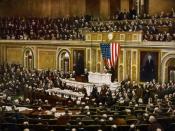America and the First World War
When war erupted in 1914, the United States attempted to remain neutral and was a proponent for the rights of neutral states. Isolationist foreign policy was encouraged by Congress's apprehensions about giving other countries a political door into US policies and the cultural melting pot of the United States' population. In spite of these factors, the United States did enter World War I, as a result of several events.
In an attempt by both the allied and the central powers to involve the Americans, the US was heavily saturated with propaganda. Much of the material had a Pro-British slant which was aided by the connection to Britain as a "cultural brother" and the United States' concern with affairs in Western Europe. While propaganda sympathetic to Germany did also exist, it did not carry much weight with the American public. Germany was seen by most Americans as a dangerous monarchy with autocratic militarist thinking, including a hidden agenda to undermine democracy and US power.
There were allegations of industrial sabotage, poisoning water supplies, kidnapping individuals, and engaging in espionage within American labor unions by Germans to keep the United States busy on the home front. These rumors, along with extensive submarine warfare, added to the distrust of the Germans.
Prior to 1915, German subs had a policy of warning and allowing time to evacuate ships carrying passengers before they sank them. However, in 1915 the Lusitania was sunk without a warning, killing over 120 Americans. One year later, the Sussex was sunk by German U-boats and American citizens were outraged at these direct violations of their neutral rights at sea. At this point, a small percentage of Americans, including presidential hopeful Teddy Roosevelt, demanded immediate warfare. In 1916 President Wilson took a stronger stance toward...


